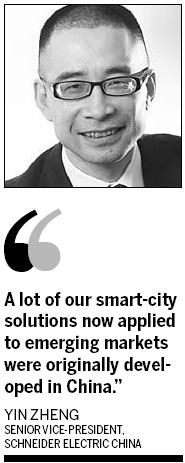Techs and the city: IT firms see challenges in China's urbanization
During the 2010 Shanghai Expo, Schneider provided more than 12,000 surveillance cameras to the city, which received more than 70 million visitors over the six-month exhibition.
The term "smart city" originated in the 1990s to signify how urban development was turning toward technology and innovation, although more recently it is being used to address the strong concern for sustainability and improving quality of urbanization.
China has expressed strong support for smart cities, with the government forecasting that 600 to 800 smart-city projects will be carried out during its 12th Five-Year Plan (2011-2015).
The Ministry of Housing and Urban-Rural Development has selected 90 cities for the projects. It also confirmed in April that a credit line of at least 440 billion yuan ($70.3 billion) has been set aside by banks and investors for the projects.
Eric Woods, a director of market research and consulting firm Navigant Research, says China has a greater ability to finance smart-city projects than Western countries, and this creates opportunities for R&D. New solutions have been particularly strong in traffic management, water and energy infrastructure, and energy-efficient buildings, he says.

"China plays a very prominent role in terms of smart-city development, not just because of the speed of its urbanization but also the consequences of economic growth," he adds.
"I think people are starting to see China as the center of innovation for urban policies that deal with the common challenges of urban infrastructure requirements."
Smart-city solutions have also gained popularity in the West, although many focus on maintaining the competitiveness of old city centers and meeting energy reduction goals.
In Europe, smart-city development is an important part of Horizon 2020, a European Union initiative that aims to secure Europe's global competitiveness.
Nikolaos Kontinakis, project coordinator of Eurocities, a network that supports local governments, says European cities have a lot to learn from Chinese ones in terms of smart-city solutions.
"European cities are old cities but can solve new problems, and Chinese cities have the ability to build innovative solutions from scratch. So we see the conversation as a two-way street," says Kontinakis.
Yin says the difference between Western and Chinese cities often means foreign companies have to adjust their solutions and business models when bringing their technologies to China, and learn new lessons in the process.
"One challenge of application is to find appropriate business models," he says. "For example, we need to consider how to best work with the government and investors, how to set an appropriate price for our services, and who is to enjoy and benefit from our services."

























